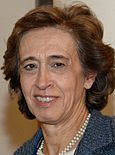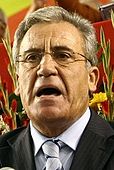Portuguese local elections, 2009
|
|
|||||||||||||||||||||||||||||||||||||||||||||||||
|---|---|---|---|---|---|---|---|---|---|---|---|---|---|---|---|---|---|---|---|---|---|---|---|---|---|---|---|---|---|---|---|---|---|---|---|---|---|---|---|---|---|---|---|---|---|---|---|---|---|
|
|||||||||||||||||||||||||||||||||||||||||||||||||
|
All 308 Portuguese municipalities and 4,260 Portuguese Parishes All 2,078 local government councils |
|||||||||||||||||||||||||||||||||||||||||||||||||
|
|||||||||||||||||||||||||||||||||||||||||||||||||
| Portugal |
 This article is part of the series: |
This article is part of the series:
Politics and government of
Portugal
The Portuguese local elections of 2009 took place on 11 October. The elections consisted of three separate elections in the 308 Portuguese municipalities, the election for the Municipal Chambers, whose winner is elected mayor, another election for the Municipal Assembly and a last one for the lower-level Parish Assembly, whose winner is elected parish president. This last was held separately in the more than 4,000 parishes around the country.
The elections resulted almost in a tie between the Socialist Party and the Social Democratic Party, in which the Social Democrats lost almost 20 municipalities and also lost a considerable number of coucilours. The Socialists, despite losing in number of municipal chambers, were the party that most councilors elected, a situation that has not happened since 1993 when in these elections the PSD elected more councilors than the PS but the PS elected more mayors than the PSD. The Socialists won also a decisive victory in Lisbon where the incumbent mayor, António Costa, defeated the former mayor and Prime Minister Pedro Santana Lopes by a considerable margin.
The Social Democratic Party lost some municipalities to the Socialists, but they did hold on municipalities like Porto, Vila Nova de Gaia, Sintra and Coimbra. The People's Party won only one municipality, Ponte de Lima, continuing its decline in comparison, for example, with the 36 mayors achieved in 1976.
...
Wikipedia



